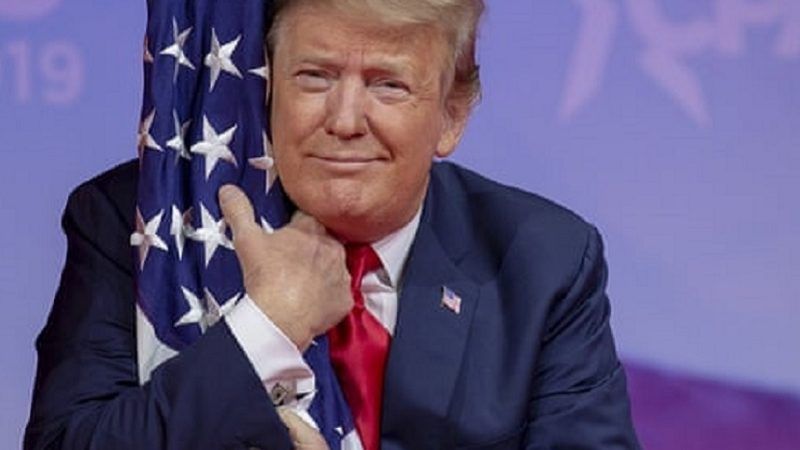Trump's New Welfare Rule Cuts Immigration Against Congressional Will
Only wealthy immigrants will have a clear shot at being admitted or staying.

President Donald Trump's much-awaited "public charge" rule to discourage immigrants from using welfare was released yesterday. It was even worse than expected. Under the pretext of cracking down on welfare use by immigrants, it will constrict immigration so much that only the most well-heeled immigrants will be able to enter the United States going forward.
Basically, Stephen Miller, the anti-immigration White House aide who fathered this 800-page rule, is trying to accomplish through administrative means what he couldn't through legislative ones; namely, dramatically slashing legal immigration and transforming America's family-based immigration system into an extreme merit-based one.
The rule, which is supposed to go into effect in mid-October (though courts are likely to intervene, for now), would brand any immigrant who is likely to qualify for even minimal social services a "public charge" and make it harder for them to enter the country if they are abroad—or, if they are already here, the rule will make it harder for them to upgrade their immigration status and obtain green cards or citizenship.
That this is a complete abuse of the original understanding of the public charge law, whose purpose was to bar indigent or disabled folks ("idiots, lunatics, convicts," in the not-so-politically correct language of the times) likely to become wards of the state, is an understatement. Administrative guidance that has been in effect since 1999 interpreted this law to mean anyone who gets cash benefits through programs such as Temporary Assistance for Needy Families (TANF) and Social Security, provided those benefits account for 50 percent (or more) of their income.
Under the Trump administration's new rule, anyone who collects (or is likely to collect) any means-tested public benefits for more than 12 months in any 36-month period will have a strike against them when they apply for a visa, even possibly just visitor visas. Worse, given that there is no floor to the amount that immigrants have to collect to be deemed a public charge, notes Cato Institute's David Bier, in principle they could be "99.9 percent self-sufficient and still be deemed a public charge." This stipulation, Bier maintains, is worse than the administration's original proposal, which would have slapped the public charge designation on immigrants who were 95 percent self-sufficient. For a family of four at 250 percent of the poverty level, that would have worked out to $2.50 per person per day in public assistance.
Making matters worse, the public charge designation would no longer be restricted to those who collect cash benefits. Bier notes that the type of benefits considered will now include both cash and non-cash benefits—federal, state, or local. Even more diabolically, immigrants don't even have to actually collect these benefits to be denied entry or an upgrade in immigration status, they simply have to be deemed "likely" to do so.
How will this likelihood be estimated? Under current guidance, having a family who sponsors an immigrant and pledges to cover their expenses is a major plus factor. But that won't count for much under Trump's new dispensation. If someone doesn't speak English or have a job already lined up, that'll be considered a major negative factor. "The process to identify someone's likelihood to use benefits is skewed to create denials," maintains Bier. Even if low-income immigrants who are here forego benefits for themselves or their American-born children, as many of them are doing, to obtain green cards or citizenship, it may not help.
Meanwhile, any American of modest means who wants to sponsor their husband, wife, parent, or minor child—categories that constitute the vast bulk of legal, family-based immigration—to come to the United States will have a very hard time. Siblings and adult children can just forget about it. The only folks who will have a clear shot at getting in are those with high-paying jobs.
Basically, the administration is telling low-income families that they don't have a right to be together. This is family separation by bureaucratic means.
There could be a rationale for doing something this draconian if immigrants were abusing welfare. But that is not the case, contrary to nativist mythology that guides Miller and his ilk. The opposite, in fact.
As I've noted previously, the National Academy of Sciences has estimated that an average immigrant arriving today would contribute $150,000 more in taxes than he or she would consume in benefits over their lifetime. Furthermore:
Even poorer immigrants tend to consume welfare at lower rates and lower amounts than the native born. Furthermore, even when immigrants receive welfare, they don't quit working: 14 percent more keep their jobs as compared to the native born. And none of this takes into account the fact that immigrants constitute a windfall for America's public coffers given that they tend to come during their peak productive years after another society has borne the cost of raising and educating them. If anything, every working immigrant is a gift to American taxpayers. And when one takes into account the taxes pocketed thanks to the economic growth generated by immigrants, their fiscal impact becomes overwhelmingly positive.
If President Obama had made such aggressive use of his executive powers, Republicans would have cried bloody murder.
The administration didn't offer any estimate of how much this rule will slash legal immigration, but there is little doubt that the impact will be significant. All those who still believe that Trump opposes only illegal immigration and not immigration in general are just fooling themselves. There is almost no category of immigrants he has left un-assaulted, and his new rule disses precisely those whom the Statue of Liberty seeks to welcome.


Show Comments (440)